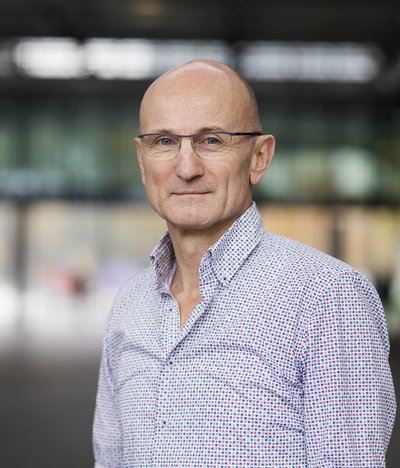Albert Schenning
Department / Institute
Group

RESEARCH PROFILE
Albert Schenning leads the research group Stimuli-responsive Functional Materials and Devices (SFD). His research interests center on stimuli responsive functional materials and devices. This entails the development of polymer materials with new responsive functionalities and integrating them into devices to meet industrial and societal challenges in the fields of sustainable energy, water-management, healthcare & personal comfort. The research follows the complete chain of knowledge from molecule to device, i.e. from organic synthesis to prototype. Both top-down and bottom-up methods are employed for the preparation of hierarchically structured materials with programmed responsive and functional properties.
Let's make stimuli-responsive materials smart
ACADEMIC BACKGROUND
Albert Schenning studied chemistry at Radboud University Nijmegen, where he obtained his master's degree in 1992 and his doctorate in 1996. His PhD thesis on supramolecular architectures based on porphyrin and receptor molecules was supervised by Dr. Martin Feiters and Prof. Roeland Nolte. Between June and December 1996, Schenning was a post-doctoral fellow in the group of Prof. Bert Meijer at Eindhoven University of Technology (TU/e), working on dendrimers. In 1997, he investigated pi-conjugated oligomers and polymers based on triacetylenes with Prof. François Diederich at the ETH in Zurich. From 1998 until 2003, Schenning was a fellow of the Royal Netherlands Academy of Arts and Sciences (KNAW) at the TU/e Laboratory of Macromolecular and Organic Chemistry, active in the field of supramolecular organization of pi-conjugated polymers. In 2003 he was appointed assistant professor, in 2005 associate professor and in 2014 full professor of Stimuli-responsive Functional Materials and Devices at TU/e.
Key Publications
-
A.P.H.J. Schenning,C. Roman Vas,J.W. Weener,M.W.P.L. Baars,S.J. Gaast, van der,E.W. Meijer
Amphiphilic dendrimers as building blocks in supramolecular assemblies
Journal of the American Chemical Society (1998) -
P. Jonkheijm,P.P.A.M. Schoot, van der,A.P.H.J. Schenning,E.W. Meijer
Probing the solvent-assisted nucleation pathway in chemical self-assembly
Science (2006) -
K. Kumar,Chr. Knie,D. Bleger,M.A. Peletier,H.B. Friedrich,S. Hecht,D.J. Broer,M.G. Debije,A.P.H.J. Schenning
A chaotic self-oscillating sunlight driven polymer actuator
Nature Communications (2016)
Ancillary Activities
- Associate Editor ACS Applied Materials & Interfaces, ACS